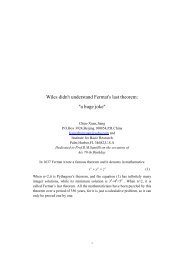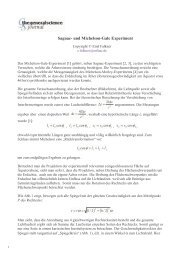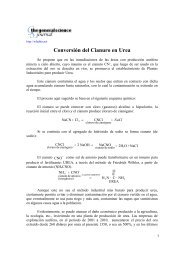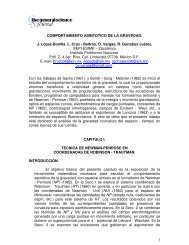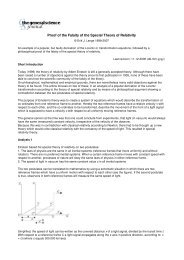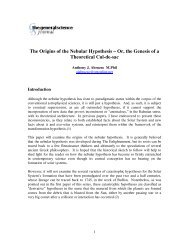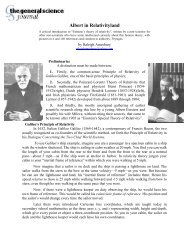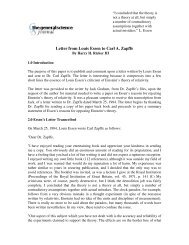MAGNETISM DURING THE SEVENTEENTH CENTURY HH Ricker III
MAGNETISM DURING THE SEVENTEENTH CENTURY HH Ricker III
MAGNETISM DURING THE SEVENTEENTH CENTURY HH Ricker III
Create successful ePaper yourself
Turn your PDF publications into a flip-book with our unique Google optimized e-Paper software.
3.To see whether a needle begins to turn just at the center of gravity.” 28<br />
Following the demonstration of these experiments, Robert Hooke conceived of a way whereby<br />
the mechanical origin of magnetism could be established. Hooke was firmly convinced of the<br />
mechanical nature of magnetism and saw a mechanical means to demonstrate it by the extreme<br />
mechanical forces induced in iron by drilling.<br />
The controversy became heated when Lister responded to the assertions by his opponents “that<br />
most bodies would turn magnetical by the fire.” This was a peculiar twist of interpretation. The<br />
mechanists were asserting that heat was a mechanical phenomenon, and that magnetism was<br />
produced by heat. So that Lister’s demonstration using pyrites proved nothing. Lister’s position<br />
in response to the mechanists was that only pyrite turned magnetical in the flame. The argument<br />
produced a curious episode. The Oxford group claimed to have produced a nonmagnetic iron.<br />
Lister’s response was that he “desired to be satisfied , that the ingot, which they had made, was<br />
iron.” The controversy was now clearly beginning to become very confusing. To assert that iron<br />
was not magnetic was contrary to everything which had been firmly established by Gilbert and<br />
his predecessors. But, the mechanists seemed intent upon achieving their objective of winning<br />
the day.<br />
Lister’s response was a paper presented at a meeting of the Royal Society in early 1684. The<br />
paper was titled “Concerning Thunder and Lightning being from the Pyrites.” His argument was<br />
an elaboration upon his previous insistence that thunder and lightning were caused by the<br />
ignition in the air of the exhalation of pyrites. His proof consisted of the reports of compass<br />
reversal, which demonstrated that lightning was magnetic. This idea may have been stimulated<br />
by continued reports of instances of compass reversal. In 1681, a ship bound for Boston was<br />
struck by lightning. “The compasses were changed” so that “the north point was turn’d clear<br />
south”. The reversal being exact, the ship was steered to Boston with the compass completely<br />
reversed. 39 This was certainly odd. Why was the compass exactly reversed instead of being<br />
changed to some other direction? The answer would not be determined until more than one<br />
hundred years later, when the oscillatory nature of the electric discharge of lightning would be<br />
understood.<br />
After Lister’s paper was read before the society, Robert Hooke performed a decisive experiment<br />
before a Royal Society meeting. He demonstrated that magnetism was induced in an iron drill bit<br />
by the mechanical action of drilling. But this did not immediately satisfy all concerns, because it<br />
did not address the “magneticalness of lightning”. This was answered by an impact explanation<br />
of compass reversal. Henry Power had shown that the polarity of an iron rod could be reversed<br />
by percussion. This was advanced as the explanation for compass reversal to counter the<br />
“decidedly non-mechanical suggestion that there was a chemical, spiritual essence to<br />
magnetism.” Hooke’s explanation was given as follows:<br />
“Mr. Hooke remarked, that by striking a needle with a brass hammer, the pole might be changed<br />
from north to south. To which it was answered by Dr. Wallis that there was nothing of<br />
hammering mentioned in this relation [of the lightning flash]. but with more probability a new<br />
touch of a magnet. However, Mr. Hooke was ordered to show at the next meeting, how the pole<br />
of a needle is altered by striking, that the applicableness to this case might the better appear.” 28



